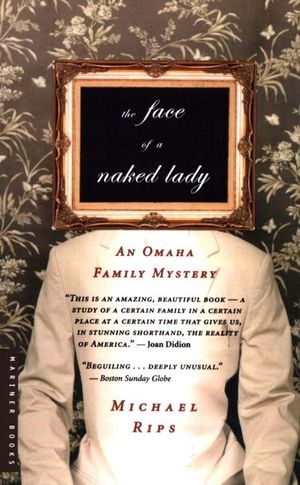The Face of a Naked Lady
Published by Houghton Mifflin Harcourt
A son uncovers the remarkable secret life of his midwestern father—and his Nebraska city—in this “beguiling [and] deeply unusual” memoir (The Boston Sunday Globe).
Nick Rips’s son had always known him as a conservative midwesterner, dedicated, affable, bland to the point of invisibility. Upon his father’s death, however, Michael Rips returned to his Omaha family home to discover a hidden portfolio of paintings—all done by his father, all of a naked black woman.
His solid Republican father, Michael would eventually discover, had an interesting past and another side to his personality. Raised in one of Omaha’s most famous brothels, Nick had insisted on hiring a collection of social mis?ts to work in his eyeglass factory—and had once showed up in his son’s high school principal’s of?ce in pajamas.
As Michael searches for the woman in the paintings, he meets, among others, an African American detective who swears by the clairvoyant powers of a Mind Machine, a homeless man with ?ve million dollars in the bank, an underwear auctioneer, and a ?ying trapeze artist on her last sublime ride. Ultimately, in his investigations through his Nebraska hometown, he will discover the mysterious woman—as well as a father he never knew, and a profound sense that all around us the miraculous permeates the everyday.
“Writing with similar pain and urgency as Nick Flynn in Another Bullshit Night in Suck City and August Kleinzahler in Cutty, One Rock, Rips’ terse, flinty syntax perfectly embodies the hard-boiled nature of this nearly surreal true-life tale.” —Booklist
“An amazing, beautiful book—a study of a certain family in a certain place at a certain time that gives us, in stunning shorthand, the reality of America.” —Joan Didion, author of The White Album
“At once a lyrical family portrait, a philosophical inquiry, a bittersweet evocation of a lost time and place, and an enthralling domestic mystery.” —Susan Orlean, author of The Orchid Thief
“Quirky, funny, moving, and immensely readable . . . a brilliantly observed story about place, family, and race in America.” —Randall Kennedy
Nick Rips’s son had always known him as a conservative midwesterner, dedicated, affable, bland to the point of invisibility. Upon his father’s death, however, Michael Rips returned to his Omaha family home to discover a hidden portfolio of paintings—all done by his father, all of a naked black woman.
His solid Republican father, Michael would eventually discover, had an interesting past and another side to his personality. Raised in one of Omaha’s most famous brothels, Nick had insisted on hiring a collection of social mis?ts to work in his eyeglass factory—and had once showed up in his son’s high school principal’s of?ce in pajamas.
As Michael searches for the woman in the paintings, he meets, among others, an African American detective who swears by the clairvoyant powers of a Mind Machine, a homeless man with ?ve million dollars in the bank, an underwear auctioneer, and a ?ying trapeze artist on her last sublime ride. Ultimately, in his investigations through his Nebraska hometown, he will discover the mysterious woman—as well as a father he never knew, and a profound sense that all around us the miraculous permeates the everyday.
“Writing with similar pain and urgency as Nick Flynn in Another Bullshit Night in Suck City and August Kleinzahler in Cutty, One Rock, Rips’ terse, flinty syntax perfectly embodies the hard-boiled nature of this nearly surreal true-life tale.” —Booklist
“An amazing, beautiful book—a study of a certain family in a certain place at a certain time that gives us, in stunning shorthand, the reality of America.” —Joan Didion, author of The White Album
“At once a lyrical family portrait, a philosophical inquiry, a bittersweet evocation of a lost time and place, and an enthralling domestic mystery.” —Susan Orlean, author of The Orchid Thief
“Quirky, funny, moving, and immensely readable . . . a brilliantly observed story about place, family, and race in America.” —Randall Kennedy
BUY NOW FROM
COMMUNITY REVIEWS

